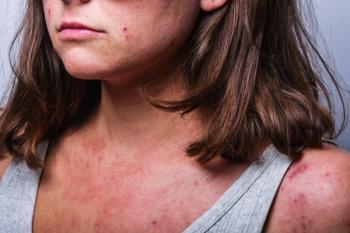
Phase 2b study: Rezpegaldesleukin demonstrates efficacy in atopic dermatitis patients
Rezpegaldesleukin improved disease severity and patient-reported outcomes in a phase 2b atopic dermatitis trial with sustained benefit.
Nektar Therapeutics has reported new data from the REZOLVE-AD phase 2b trial of rezpegaldesleukin, an interleukin-2 (IL-2) pathway agonist designed to expand regulatory T cells (Tregs), in patients with moderate to severe atopic dermatitis. Results were presented during a late-breaking oral session at the 2025 European Academy of Dermatology and Venereology (EADV) Congress in Paris, France.1,2
The randomized, double-blind study enrolled 393 adult patients who received subcutaneous rezpegaldesleukin at 24 µg/kg every 2 weeks, 18 µg/kg every 2 weeks, 24 µg/kg every 4 weeks, or placebo. Primary and secondary endpoints were assessed at week 16, with an ongoing blinded maintenance period extending treatment up to week 52.
Efficacy outcomes
Rezpegaldesleukin achieved statistical significance for the primary endpoint of mean improvement in the Eczema Area and Severity Index (EASI) at week 16 across all treatment arms compared with placebo. Patients in the high-dose arm demonstrated a 61% mean reduction in EASI from baseline versus 31% in the placebo group. Significant improvements were also observed in EASI-75, EASI-90, validated Investigator Global Assessment for Atopic Dermatitis (vIGA-AD) 0/1 responses, itch numerical rating scale (NRS), and body surface area (BSA) involvement.
Patient-reported outcomes also favored rezpegaldesleukin. At week 16, 72% of patients in the high-dose group achieved at least a 4-point reduction on the Dermatology Life Quality Index (DLQI) compared with 54% receiving placebo. Improvements were also seen in Atopic Dermatitis Control Tool (ADCT) scores, pain NRS, and sleep disturbance measures.
Jonathan Silverberg, MD, PhD, MPH, professor of dermatology at the George Washington University School of Medicine and Health Sciences, who presented the data, noted, “These data from REZOLVE-AD presented today show a rapid onset of treatment effect for both clinician-assessed and patient-reported outcomes following the first few doses of rezpegaldesleukin. In addition, for the first time, we observe a deepening of clinical effect for patients with extended dosing of investigational therapy beyond 16 weeks, with a strengthening of absolute EASI reduction, along with higher EASI-75 and vIGA 0/1 response rates following 24 weeks of treatment.”
Among 42 patients who crossed over from placebo into the high-dose treatment arm after week 16, the mean percent reduction in EASI improved from 68% at week 16 to 75% at week 24, with corresponding increases in EASI-75 and vIGA-AD 0/1 response rates.
Safety profile
Safety findings were consistent with prior studies. Treatment-emergent adverse events (TEAEs) occurred in 80% of patients receiving rezpegaldesleukin compared with 58% in the placebo group. The most common events were mild to moderate injection site reactions, pyrexia, and nasopharyngitis. Severe adverse events were infrequent, and no new safety signals such as conjunctivitis, oral ulcers, or cardiovascular events were observed. One death occurred in the escape arm, deemed unrelated to study treatment by investigators.
Jonathan Zalevsky, PhD, chief research and development officer at Nektar, stated, “These results from REZOLVE-AD, including the improved responses observed with duration of dosing beyond 16 weeks, demonstrate the potential of this new biology and the promise of Tregs as a therapeutic modality to treat inflammatory skin disorders. With this important validation of a novel Treg mechanism in atopic dermatitis, we look forward to reporting the results in December of this year for rezpegaldesleukin in patients with alopecia areata.”
Next steps
Rezpegaldesleukin has been granted Fast Track designation by the US Food and Drug Administration for moderate to severe atopic dermatitis and alopecia areata in patients aged 12 years and older. Phase 3 planning for atopic dermatitis is underway, and additional phase 2b data in alopecia areata are expected later in 2025.
References:
- Nektar Therapeutics. Nektar Presents New Data from REZOLVE-AD Phase 2b Study for Rezpegaldesleukin in Late-Breaker Oral Presentation at EADV 2025. Nektar Therapeutics. September 19, 2025. Accessed September 19, 2025. https://ir.nektar.com/news-releases/news-release-details/nektar-presents-new-data-rezolve-ad-phase-2b-study
- Silverberg JI, Bieber T, Warren RB, et al. Efficacy and Safety of Rezpegaldesleukin, A Selective Regulatory T-Cell-Inducing Interleukin-2 Conjugate, in the Treatment of Atopic Dermatitis: Final Results from the 16-Week Induction of a Randomized Phase 2b Study (REZOLVE-AD). Abstract. Presented at: European Academy of Dermatology and Venereology. Paris, France. https://www.nektar.com/wp-content/uploads/2025/09/EADV-2025_Silverberg-et-al_Rezpegaldesleukin_REZOLVE-AD.pdf
Newsletter
Access practical, evidence-based guidance to support better care for our youngest patients. Join our email list for the latest clinical updates.






